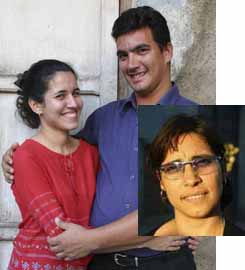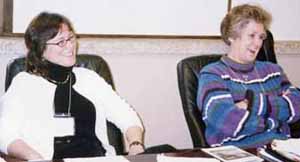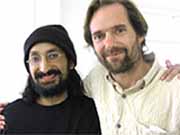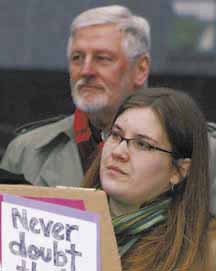Canadian Mennonite
Volume 10, No. 07
April 3, 2006

Leaders consider priorities, membership, money
Winnipeg
 |
Finalizing the national church’s top three priorities, addressing church requests to disassociate themselves from Mennonite Church Canada, deciding how to allocate a financial surplus, and the 2006-07 budget were four significant areas of discussion at the MC Canada Leadership Assembly in early March.
The annual meeting gathered together the national church’s board, all three of its supporting councils, and leadership from all five area churches. Canadian Women in Mission were also meeting as part of the event. (See story below.)
The General Board approved the final three overall priorities for the national church, a process shaped by delegates at Charlotte 2005. These are: “form a people of God,” “become a global church,” and “grow leaders for the church.” Some progress was also made in selecting a theme Scripture verse for the denomination.
Membership was a major discussion topic. As the current Provincially Active Only option for B.C. churches ends this summer, a number of leadership groups worked on this issue. The newly formed Faith and Life Committee (FLC) has been gathering input for the past several months, and it met with area church moderators and leadership staff in a day-long discussion at the Leadership Assembly.
MC Canada ends year with $229,000 surplusLloyd Plett and Randy Wiebe reported to the Mennonite Church Canada Leadership Assembly that the national church’s fiscal year ended well. Preliminary (un-audited) numbers suggest a happy confluence of higher than budgeted donation revenue of $3.95 million ($68,000 higher than the previous fiscal year) and lower than anticipated expenses. This resulted in a surplus of $229,000 (before reserve transfers) for the fiscal year ending Jan. 31, 2006. General secretary Jack Suderman said, “MC Canada leadership is particularly grateful to congregations and individuals whom we know gave sacrificially this past year.” Al Rempel, director of resource development, noted that giving from individuals and corporations was particularly strong. This was the first year since 2002 that MC Canada received more than $1 million from this group of donors. “We can rejoice in the positive results, but at the same time remember to celebrate in the context of recovery,” he said. “This year is a huge help in compensating for [MC Canada’s] first fiscal year when we had to significantly draw down reserves.” Congregational giving was down slightly from 2004, but higher than had been earlier anticipated. Expenses for the year were less because of several factors, including the fact that several staff positions were not filled for a period of time. The surplus funds will help restore reserves. Celebrating the generosity of many individuals and congregations must be balanced with cautious planning for the future growth of new ministries, cautioned Rempel. Audited financial statements will be presented to delegates at the annual assembly in Edmonton in July. |
In its report to the MC Canada General Board at the end of the assembly, FLC came out with a strong recommendation that the national church allow for “area church only” membership.
“The foundational issue is the nature of unity of Christians in the body of Christ,” said FLC chair Rudy Baergen. “The question is, ‘Can we divide structurally while still being united in Christ?’ We would like to answer that question. We say yes, we can be structurally divided but still be united in Christ. Our unity in Christ is not dependent on our organizational structure. We have already done that with MC USA. We have done that many times. Unity in Christ is sometimes maintained better when you have clear structures.
“We recommend this change to the bylaws…sooner rather than later. We think it might be the pastoral, loving thing at this point, and it might enable us to work at the unity of Christ in new ways.”
The FLC also recommended that the Edmonton assembly host a workshop on the polarity between “catholicity and holiness,” have confession of our brokenness, and distribute a study document on the subject. Baergen also suggested that the whole church find a way to “bless churches making this decision while recognizing we need some breathing room in our structures.”
The General Board did not have time to respond to the FLC report and no decisions were made on the recommendation. The board will be discussing the issue again later this month.
The General Board responded thankfully but cautiously to news of a significant budget surplus, attributed to sacrificial giving by the churches and conservative program spending, due in part to some staff positions being open during the year. Total donations were up from the previous year, with a rise in individual and corporate donations offsetting a slight drop in congregational giving. A larger factor was that spending was lower than anticipated, resulting in an overall surplus of about $230,000. (See the church’s statement in sidebar.)
The approved 2006 budget anticipates giving slightly lower than actual figures for 2005-06, with expenses slightly higher than the previous year’s expenses, resulting in a deficit of $17,000, which is to be covered by a transfer from reserves. The budget includes a 2 percent cost-of-living salary increase plus small amounts of new funding for general secretary Jack Suderman’s listening tour to all MC Canada congregations, development of e-commerce capabilities for the Resource Centre’s website, and purchases of a postage meter and a security system.
The General Board also authorized Mennonite Disaster Service to represent MC Canada in planning for a possible nationwide flu pandemic.
Visa denials have IMPaCT on pastors
 |
IMPaCT (International Mennonite Pastors Coming Together) is the name given to a brand new initiative of Mennonite Church Canada. The program—announced at last month’s Leadership Assembly—is designed to help the denomination grow as a global church, and help pastors to learn from, shape and challenge one another.
IMPaCT’s goal is to match six Mennonite pastors from abroad with six Canadian pastors for two weeks. MC Manitoba has offered to sponsor and host the first rotation, scheduled for the first two weeks of June.
However, at this point, two Cuban pastors have been denied entry into Canada. MC Canada Witness executive secretary Janet Plenert is working with the Canadian embassy in Cuba to obtain visas for the pastors, which have been initially denied by the Canadian government. “We need to get the prayer chain going on this issue,” says Plenert.
“This isn’t a theological or academic course,” notes Plenert. “It’s a practical endeavour to have pastors reflect together with Anabaptist pastors from different contexts.”
Mennonite pastors from Chile, Paraguay, Brazil and Spain, as well as Cuba, have been invited. The national church in each country is responsible for selecting their respective representative pastors.
So far, participating Mennonite congregations include Sargent Avenue, Charleswood and North Kildonan, all in Winnipeg, and two rural Manitoba congregations, Graysville and Portage. One more rural congregation has yet to be named.
MC Manitoba conference minister John Klassen, MC Canada denominational minister Sven Eriksson and Plenert are leading the initiative. A Logistics Committee and a Program Committee of local volunteers have been engaged to help coordinate the Manitoba round of IMPaCT, and Plenert hopes this local involvement will help build ownership of the project and multiply interest in what it means to become a global church.
“We are hoping [another] area conference will step forward and offer to host a 2007 event,” says Plenert.
Becoming a global church is one of three priorities that have been identified by MC Canada leadership following delegate discernment sessions at the annual assembly in Charlotte in 2005. The other two priorities are to grow leaders and form a people of God.
Canadian Women in Mission celebrates vision renewal
 |
After a “near death” experience—due in part to declining membership and the absence of younger women—Canadian Women in Mission (CWM) executive committee meetings bubbled with laughter and renewed energy as they reported on their activities and planned for the future during the recent MC Canada Leadership Assembly.
Their excitement came from a variety of sources:
• Meeting their budget.
• Beginning to implement three priorities identified during last year’s visioning process: to work more intentionally at being intergenerational; engaging non-traditional women; and focusing on education, inspiration and nurturing.
• Celebrating “countless hours of service” at local and international levels.
•Providing financial assistance for seminary, university and college students, and for the Latin American Women’s Network consultation in Costa Rica.
• Participating in Bible studies, retreats and inspirational/enrichment days across Canada, one of which resulted in the birth of a new women’s group in southwestern Ontario—Spiritual Sisterhood.
• Contributing finances and articles by Canadian writers to Timbrel: The Magazine for Mennonite Women, including an inspirational article by Mary Pries, which emphasized that it is “up to [CWM members]…to pass on the carefully nurtured flame” to the next generation.
• Helping to publish yearly Bible studies, including “My times are in your hands” by Melissa Miller, which is to be available in May/June of this year.
CWM has now found itself the beneficiary of a $70,000 gift from the past, money that came to CWM when Mennonite Women US and CWM separated a few years ago. This money grew out of a “Two pennies and prayer” project initiated by the Women’s Missionary Society in 1935, when its members decided to fund a missionary pension plan, reported CWM president Erna Neufeldt. “The fund grew, was used for its intention but eventually was not needed. [Those] women had a vision for making a difference in the lives of returning missionaries. Where and how can we make a difference in regard to this money?” she asked CWM members.
Upcoming challenges include participating in a subscription drive for Timbrel, necessitated by a serious decline in subscriptions. After a peak of 8,128 in 1998, they are down to 4,440 this year. So the new Timbrel editor, Laurie Oswald Robinson, is encouraging members to sign up 20 new subscribers each.
Peace churches address nonviolence issues at WCC assembly
Porto Alegre, Brazil
 |
At the halfway point of the Decade to Overcome Violence, Historic Peace Church representatives to the ninth annual World Council of Churches (WCC) assembly in Porto Alegre spoke from the conviction that “nonviolence is essential to Christian identity” when addressing issues involving the use of force.
Of particular concern were assembly statements on terrorism and when the use of force is appropriate for human intervention. Unlike churches that espouse the “just war” theory, the Historic Peace Churches—Mennonites, Brethren and Friends (Quakers)—maintain that any use of violence is inappropriate for Christians.
Stan Noffsinger, general secretary of the U.S. Church of the Brethren, acknowledged that it can be hard for the voice of the Historic Peace Church to be heard, particularly in the current U.S. environment. “We’ve tried to speak out, but the drums of war are pretty loud,” he said at an assembly workshop.
WCC launched the Decade to Overcome Violence five years ago with an emphasis on networking and encouraging peace efforts worldwide, asking the Historic Peace Churches at that time to give special attention to the initiative and to provide leadership by speaking out of their experiences.
In an effort to coordinate their efforts, an Historic Peace Church conference was organized in Bienenberg, Switzerland, in 2001. Seeking to broaden the discussion, the churches held their next conference in Kenya in 2004, bringing in voices from Africa.
The Kenyan conference has already borne fruit. Filibus Gwama, an assembly delegate from the Church of the Brethren in Nigeria, said his denomination began a peace education program following the conference. Last January, a coordinator was called to oversee the network. “The church is working hard to see that there is peace,” Gwama said.
That was one of many stories highlighted during a workshop at the assembly, covering various Historic Peace Church contributions to the Decade.
“The sustainability of…the Decade to Overcome Violence was very much due to the Historic Peace Churches’ engagement,” said Hansuli Gerber, Decade coordinator since 2002. “Otherwise, I don’t know how it could possibly have happened.”
Gerber said such practical service is at the heart of what the Historic Peace Churches represent. “It’s not just talking, it’s not just a matter of what we think,” he said. “It’s what we do.”
At the workshop, Fernando Enns, a German Mennonite originally from Brazil who initially put forth the motion to make overcoming violence a more central part of the WCC’s mandate in 1998, told the workshop that the need for such an emphasis hasn’t diminished. “All over the world, churches are facing the challenge of violence. The question is always before us: How do we respond?”
He said it is easy for Christians to say, “We’re fed up with turning the other cheek because they’ll slap us again.” But, as Historic Peace Churches, he added, “we stick to the conviction that nonviolence is essential to Christian identity.”
No shots fired as three CPT hostages rescued
Kitchener, Ont.
 |
Three Christian Peacemaker Teams (CPT) activists kidnapped in Iraq were rescued March 23 by coalition forces in western Baghdad. All three CPTers—Canadians Jim Loney, 41, and Harmeet Singh Sooden, 33, and Briton Norman Kember, 74—were first taken to the British Embassy compound in Baghdad’s Green Zone following their release, before flying home to the respective countries.
Within hours, celebratory vigils were planned in many communities, including Kitchener, Ont. “We’re going heavy on the celebrating, but with a streak of sadness,” said organizer Matthew Bailey-Dick, a CPT volunteer. “It’s difficult to comprehend the joy of the hostages’ release alongside the death of their colleague.”
“It’s great to be free,” Kember said in a statement issued by the British Embassy. He was later criticized by British media for not being more effusive in his praise of their military rescuers.
MWC leaders mourn death of CPT workerA gathering of the worldwide Anabaptist group that helped give birth to Christian Peacemaker Teams (CPT) mourned the death of CPT worker Tom Fox on March 11. The Mennonite World Conference General Council, composed of about 100 Anabaptist leaders from around the world, expressed “deep grief” at Fox’s death in a letter to CPT. Word was received during the council’s triennial meeting last month that Fox, 54, a Quaker from Clear Brook, Va., had been found dead in Iraq after being held hostage since November. “We mourn with you the loss of this courageous man, whose life and words testified to the power of the nonviolent love of God in Jesus Christ,” stated the letter to CPT. It was signed by MWC president Nancy R. Heisey of the United States, vice-president Danisa Ndlovu of Zimbabwe, and executive secretary Larry Miller of France. The letter noted MWC’s connection to CPT’s beginning. “We recall that the challenge to begin the work of [CPT] was given at the [MWC] assembly in Strasbourg, France, in 1984,” the MWC officials wrote. CPT was founded two years later, in 1986, with the support of Mennonites and other peace churches. The MWC letter to CPT was accompanied by handwritten notes of sympathy and support from General Council members. Mennonite Church Canada general secretary Jack Suderman and MC USA executive director Jim Schrag prayed during the council’s time of remembering Fox. “We mourn the death of Tom Fox, your servant,” Suderman prayed. “We pray for the peace and justice he died for.” Schrag prayed for all in Iraq who suffer due to “the terrorism of the war itself.” He also prayed for Christians who face persecution in many countries, noting that “the blood of the martyrs is the seed of the church.” |
Not so Jim Loney. In a prepared statement, he said, “For the British soldiers who risked their lives to rescue us, to the government of Canada who sent a team to Baghdad to help secure our release, for all those who thought about and prayed for us, for all those who spoke for us when we had no voice, I am forever and truly grateful. It’s great to be alive.”
Of his 118 days in captivity, Loney said, “It was a terrifying, profound, powerful, transformative and excruciatingly boring experience.”
He was mindful of those still in captivity in Iraq and around the world. “I’m thinking specifically of prisoners held all over the world, people who have slipped into an abyss of detention without charge, due process, hope of release, some victims of physical and psychological torture, people unknown and forgotten. It is my deepest wish that every forsaken human being should have a hand of solidarity reaching out to them.”
When asked what he wants to do first upon his arrival home, Loney replied, “All I really want to do is to love and be loved by the people that I love….
“I need some time to get reacquainted with my partner Dan, my family, my community and freedom itself.”
News reports indicated that the hostages—seized Nov. 26 in Baghdad by a group calling itself the Swords of Righteousness Brigade—had been left unattended by their captors and that they were freed without any shots being fired.
The rescue of the three comes two weeks after the body of a fourth kidnapped CPTer, American Tom Fox, 54, was discovered March 9 in Baghdad. Fox had been shot to death, but had not been beaten before his death, as had been previously reported.
U.S. Army Maj. Gen. Rick Lynch told CNN that a detainee arrested March 22 had supplied information that led authorities to the hostages’ whereabouts only a few hours later. The rescue was carried out at about 8 a.m. Iraqi time, March 23, in an empty house in western Baghdad, the BBC reported. The three were found with their hands tied, but officials said they were in relatively good condition. Unconfirmed reports suggest that Canada’s elite Joint Task Force-2 and the RCMP were also involved in the rescue mission.
“We are very glad to hear of their release and waiting to see them,” said Maxine Nash, one of three CPT workers remaining in Baghdad among a tiny number of private foreign organizations, shortly after their rescue.
In a statement released March 23, CPT expressed joy tinged with grief.
“Our hearts are filled with joy today as we heard that Harmeet Singh Sooden, Jim Loney and Norman Kember have been safely released in Baghdad,” CPT co-directors Doug Pritchard and Carol Rose stated. “Christian Peacemaker Teams rejoices with their families and friends at the expectation of their return to their loved ones and community. Together we have endured uncertainty, hope, fear, grief and now joy during the four months since they were abducted in Baghdad….
“Our gladness today is made bittersweet by the fact that Tom is not alive to join in the celebration. However, we are confident that his spirit is very much present in each reunion.”
In conclusion, the statement said, “Living through the many emotions of this day, we remain committed to the words of Jim Loney, who wrote, ‘With God’s abiding kindness, we will love even our enemies. With the love of Christ, we will resist all evil. With God’s unending faithfulness, we will work to build the beloved community.’”
 |
Pritchard told a Toronto news conference that he believed the hostages’ “commitment to peace and justice” helped them endure their ordeal. “We had hoped for the day when all four men would be released together,” Pritchard said. “Our gladness today is incomplete.”
In Vancouver, a brother of Loney’s told Canadian Press that his family was overjoyed at news of the rescue. “You could say ‘euphoric’ is the word,” said Matt Loney. “It’s the happiest day I’ve had in 115 days.”
In Auckland, New Zealand, Sooden’s brother-in-law told TV One News that the family was eager to be reunited with the former hostage. “We’re just looking forward to getting hold of him, giving him a big hug,” said Mark Brewer.
MCC maintains Iraq program despite war
Amman, Jordan
Three years have passed since the United States military forces invaded Iraq in March 2003. The volatile security situation prevents Mennonite Central Committee (MCC) from placing workers in the country, but it continues to develop and support projects in Iraq, says MCC Iraq program coordinator Peter Dula.
“The war affects all our projects with interruptions, delays and long periods of inactivity, but none of them have completely shut down,” explains Dula, who manages the program from Amman, Jordan.
Working in partnership with Iraqi churches and non-governmental organizations, MCC provides humanitarian aid and supports programs that focus on education, health, vocational training, conflict resolution and peacebuilding initiatives.
Fighting between the multi-national forces and various insurgent groups has created a large-scale internal displacement of people. MCC has responded by distributing nearly 4,000 relief kits to displaced families in various parts of Iraq, particularly in and around Fallujah. MCC has also distributed 12,000 school kits to children from low-income families in Baghdad and provided emergency food assistance to low-income families from Iraq living temporarily in Jordan.
Examples of MCC’s educational support include structural renovations to schools, construction and furnishing of libraries, literacy and vocational training, and health awareness workshops. It also supported renovations to a church building in northern Iraq that is used as a shelter for women and for sewing workshops.
While the U.S. government sees the nationwide referendum last October and the December 2005 election as signs of progress, personal security for most Iraqis continues to deteriorate, states Dula. Tension among the country’s ethnic and religious groups, kidnappings of Iraqis by Iraqis for ransom, and disruptions in basic services, such as electricity and running water, have resulted in MCC increasing its resources for conflict resolution and peacebuilding programs.
“People in Iraq yearn for stability,” Dula stresses. “Hundreds of thousands of Iraqis have left the country, with many of them in legal limbo in neighbouring countries such as Syria and Jordan.”
MCC peacebuilding initiatives in Iraq focus on teaching conflict resolution skills, strengthening the capacity of Iraqi organizations involved in conflict resolution and peacebuilding, and identifying ways to connect Iraqi peacebuilders with regional peacebuilding networks.
Third anniversary of Iraq war: Have we learned from our mistakes?
The kidnapping and recent killing of Tom Fox, a Quaker working with Christian Peacemaker Teams in Iraq, have refocused the eyes of the church on the volatile situation in Iraq.
“Almost three years after the overthrow of Saddam Hussein’s regime, Iraq is at serious risk of civil war and disintegration,” writes Joost Hiltermann, an analyst with the International Crisis Group, in the March 5 Baltimore Sun.
Indeed, a recent poll shows that 80 percent of the U.S. public believes civil war in Iraq is likely.
This is not the way it was supposed to be.
When President George W. Bush spoke at the American Enterprise Institute less than a month before launching a war against Iraq in March 2003, he said that a U.S.-led military invasion would bring democracy to Iraq and would be the first step toward bringing peace in the Israeli-Palestinian conflict as well.
Three years later, Saddam Hussein is on trial and elections have been held, but Iraq is in shambles. Bombings kill dozens of Iraqis almost daily, as sectarian violence is on the rise. By conservative estimates, between 33,600 and 37,750 Iraq civilians have been killed since the war began. Electricity and oil production have yet to return to pre-war levels.
More than 2,300 U.S. soldiers and another 200 coalition troops have died in Iraq since 2003.
The United States has already spent nearly $250 billion for the war in Iraq, and Congress has given the green light to spend tens of billions of dollars more.
Congress initially earmarked $20 billion for rebuilding Iraq’s infrastructure, but much of that amount has been re-routed for security. Many reconstruction projects will not be completed.
The situation in Iraq is a powerful reminder that war does not create the space for democracy to flourish.
But even as Iraq crumbles, hostile rhetoric and ominous threats between the United States and Iran are on the rise.
This week, the Bush administration issued an updated version of its three-year-old National Security Strategy of the United States, which set the framework for a pre-emptive war with Iraq. Rather than admitting that the Iraq war was ill-conceived, the revised strategy reaffirms America’s right to take “anticipatory action” to defend itself against perceived threats.
It also names Iran as the single greatest challenge to U.S. security.
Meanwhile, the House International Relations Committee voted 37-3 this week for a bill that would cut off economic aid to any country that invests in Iran’s energy sector.
For its part, the Iranian government threatens to retaliate with harm if the United States harms Iran.
Peace and justice advocates do well to call upon U.S. policymakers to acknowledge the failure of the war in Iraq and to recommit resources for rebuilding that devastated nation.
It is also a critical time for advocates to urge a more constructive course in the current standoff with Iran.
The only thing worse than making big mistakes is to repeat them.